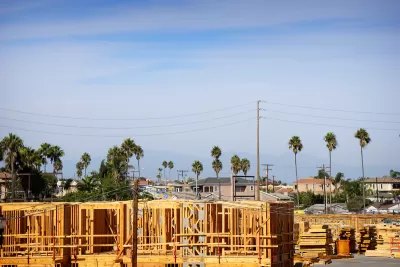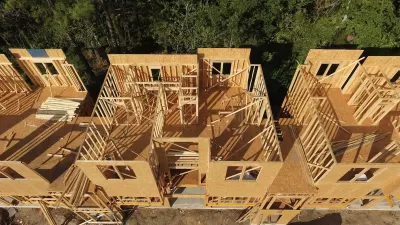Housing advocates worry that, without government guardrails, buildings may not remain affordable or well-maintained in the long term.

“Across California, efforts to address the homelessness crisis by building more affordable housing with government money have been plagued by sky-high costs,” reveals an article by Christine Mai-Duc and Will Parkers in The Wall Street Journal, prompting some developers to forgo government subsidies to bring down construction costs for affordable housing.
“Some affordable-housing veterans worry whether privately funded construction can scale quickly enough to match the scope of the homelessness problem and whether its backers will maintain their commitments to serve the needy.” But developers argue sticking with private financing cuts millions in ‘soft costs’ and makes affordable housing production faster. “Advocates have also questioned how many buildings reliant on renters with housing vouchers can be sustained unless the federal government greatly increases funding for them.”
In California, recent legislation is making it easier for privately financed affordable housing developments to move forward. As the article points out, “Though construction doesn’t use public financing, many privately funded buildings would likely still depend on government funds to operate. Formerly homeless residents at SDS-financed properties, for example, are expected to use federal housing vouchers or other rental assistance to pay rent. The properties can also qualify for property-tax exemptions.”
FULL STORY: Why Private Developers Are Rejecting Government Money for Affordable Housing

Alabama: Trump Terminates Settlements for Black Communities Harmed By Raw Sewage
Trump deemed the landmark civil rights agreement “illegal DEI and environmental justice policy.”

Study: Maui’s Plan to Convert Vacation Rentals to Long-Term Housing Could Cause Nearly $1 Billion Economic Loss
The plan would reduce visitor accommodation by 25% resulting in 1,900 jobs lost.

Why Should We Subsidize Public Transportation?
Many public transit agencies face financial stress due to rising costs, declining fare revenue, and declining subsidies. Transit advocates must provide a strong business case for increasing public transit funding.

Paris Bike Boom Leads to Steep Drop in Air Pollution
The French city’s air quality has improved dramatically in the past 20 years, coinciding with a growth in cycling.

Why Housing Costs More to Build in California Than in Texas
Hard costs like labor and materials combined with ‘soft’ costs such as permitting make building in the San Francisco Bay Area almost three times as costly as in Texas cities.

San Diego County Sees a Rise in Urban Coyotes
San Diego County experiences a rise in urban coyotes, as sightings become prevalent throughout its urban neighbourhoods and surrounding areas.
Urban Design for Planners 1: Software Tools
This six-course series explores essential urban design concepts using open source software and equips planners with the tools they need to participate fully in the urban design process.
Planning for Universal Design
Learn the tools for implementing Universal Design in planning regulations.
Smith Gee Studio
Alamo Area Metropolitan Planning Organization
City of Santa Clarita
Institute for Housing and Urban Development Studies (IHS)
City of Grandview
Harvard GSD Executive Education
Toledo-Lucas County Plan Commissions
Salt Lake City
NYU Wagner Graduate School of Public Service





























